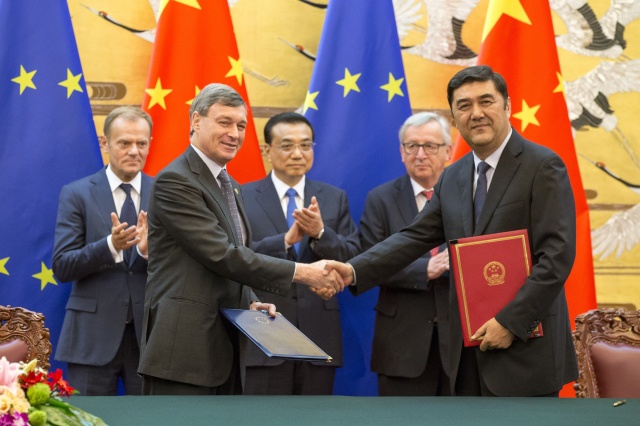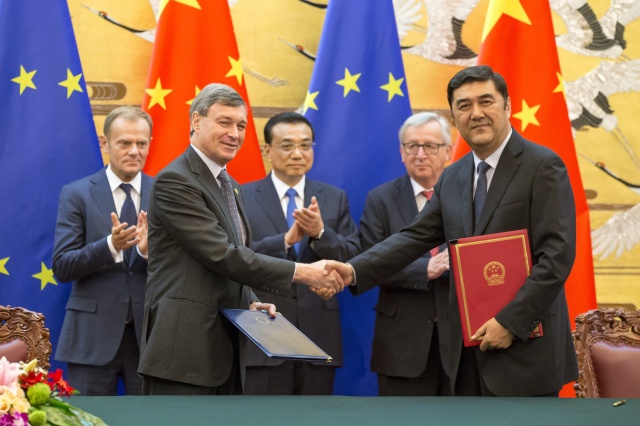By Li Ning from People's Daily

G20 members should focus more on inclusive growth in order to ensure every country around the world benefits from economic globalization, EU Ambassador to China Hans Dietmar Schweisgut told the People’s Daily in a recent interview.
Amid the sluggish recovery of the global economy, the theme of this year’s G20 summit, “Towards an innovative, invigorated, interconnected and inclusive world economy,” carried extra significance, the ambassador said of the recently concluded G20 Summit.
He added that the attendance of both Jean-Claude Juncker, president of the European Commission, and Donald Tusk, president of European Council, proved the importance given by the EU to the Hangzhou Summit.
Representing 90 percent of the global economy, 80 percent of world trade and 2/3 of the world population, G20 members should contribute to an open and equal-footed global trade system and provide solutions acceptable to all by reinforcing coordination and collaboration based on the G20 platform, he further suggested.
Stressing the importance of “innovation,” a key word of the summit theme, Schweisgut said that China's strategy of mass entrepreneurship and innovation also applies this principle.
He at the same time expected an enhanced EU-China cooperation in enterprise development, adding that the EU highly values innovation and entrepreneurship.
According to him, as a major platform of global economic governance, the G20 also shoulders a responsibility for intensifying constructive and open dialogues between industrialized countries and emerging markets in terms of international economy, monetary policies and financial system.
Therefore, G20 members should ensure every country around the world benefits from economic globalization by focusing more on inclusive growth, he added.
Schweisgut also urged the G20 to discuss sustainable and inclusive growth beyond monetary and financial policies, given the special background that it is now transforming from a crisis response mechanism into a long-acting governance one.
Hailing bilateral ties, he said that China and the EU are strategic partners highly dependent on each other, adding that EU welcomes investment from China, which amount hit a record high of 200 billion euros in 2015.
The EU is paying attention to the One Belt and One Road initiative proposed by China, and is willing to launch more cooperation with China in infrastructure construction, he said.
Amid the sluggish recovery of the global economy, the theme of this year’s G20 summit, “Towards an innovative, invigorated, interconnected and inclusive world economy,” carried extra significance, the ambassador said of the recently concluded G20 Summit.
He added that the attendance of both Jean-Claude Juncker, president of the European Commission, and Donald Tusk, president of European Council, proved the importance given by the EU to the Hangzhou Summit.
Representing 90 percent of the global economy, 80 percent of world trade and 2/3 of the world population, G20 members should contribute to an open and equal-footed global trade system and provide solutions acceptable to all by reinforcing coordination and collaboration based on the G20 platform, he further suggested.
Stressing the importance of “innovation,” a key word of the summit theme, Schweisgut said that China's strategy of mass entrepreneurship and innovation also applies this principle.
He at the same time expected an enhanced EU-China cooperation in enterprise development, adding that the EU highly values innovation and entrepreneurship.
According to him, as a major platform of global economic governance, the G20 also shoulders a responsibility for intensifying constructive and open dialogues between industrialized countries and emerging markets in terms of international economy, monetary policies and financial system.
Therefore, G20 members should ensure every country around the world benefits from economic globalization by focusing more on inclusive growth, he added.
Schweisgut also urged the G20 to discuss sustainable and inclusive growth beyond monetary and financial policies, given the special background that it is now transforming from a crisis response mechanism into a long-acting governance one.
Hailing bilateral ties, he said that China and the EU are strategic partners highly dependent on each other, adding that EU welcomes investment from China, which amount hit a record high of 200 billion euros in 2015.
The EU is paying attention to the One Belt and One Road initiative proposed by China, and is willing to launch more cooperation with China in infrastructure construction, he said.
 Menu
Menu
 EU ambassador calls for focus of G20 on inclusive growth
EU ambassador calls for focus of G20 on inclusive growth
















